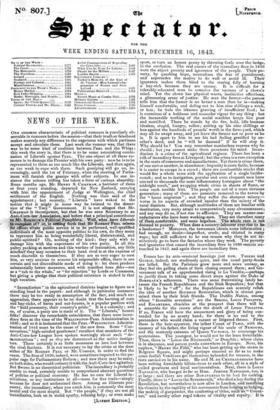• "Incendiarism" in the agricultural districts begins to figure as
a standing head in the papers : and although in particular instances there may be too ready an assumption of the fact, and much ex- aggeration, there appears to be no doubt that the burning of corn and hay-ricks, of barns and out-houses, is a popular pastime with the "bold peasantry, their country's pride." It is a calamity ; and so, of course, a party use is made of it. The "Liberals," honest . folks ! discover the remarkable coincidence, that there were incen- diary fires at-the time of the WELLINGTON-PEEL Administration in 1830; and so it is insinuated that the PEEL -WELLINGTON Adminis- tration of 1843 must be the cause of the new fires. Some " Con- servatives," high-minded gentlemen ! recollect that members of the Anti-Corn-law League have spoken warningly about such " de- monstrations " ; and so they are denounced as the active instiga- tors. There certainly is as little meanness as love lost between -the rival factions. It is not necessary to lay the crime at the door either of Sir ROBERT PEEL or Mr. COBDEN, in order to find the cause. The fires of 1830, indeed, were sometimes imputed to the po- pular rage for Parliamentary Reform ; and now there may be many, on both sides, who would connect it with the Anti-Corn-law agitation. Bat SWING is no theoretical politician. The incendiary is probably unable to read, certainly unable to comprehend abstract questions of politics or political economy. He has no care for Liberal in- stitutions, or any institutions at all—none for free trade—simply because he does not understand them. Among an illiterate pea- santry, the incendiary, when you catch him, is commonly the most brutal and the most stupid. But "the people," if they are not all incendiaries, look on in stolid apathy, refusinghelp ; or even make
sport, or turn an honest penny by throwing fowls over the hedge, in the confusion. The real causes of the incendiary fires in 1830 were the abject poverty and ignorance of the people. Their po- verty, by quashing hope, neutralizes the fear of punishment, and supersedes the motive to do well or avoid ill. _Their ignorance makes them blind to the staring folly of burning a hay-rick because they are uneasy. It is difficult for a tolerably-educated man to conceive the vacancy of a 'clown's mind. Yet the clown has physical wants, instinctive affections, a glimmering sense of justice. He sees the farmer—the parson tells him that the farmer is no better a man than he is—making himself comfortable, and doling out to him nine shillings a week, or less ; he feels the irksome gnawing of insufficient food ; he is conscious of a boldness and muscular vigour for any thing : but the inexorable working of the social machine keeps him poor and mortified. There he stands by the tire, bold, idle because idealess, stupid, hungry, sullen; casting up his nine shillings or less against the hundreds of pounds' worth in the farm-yard, which may all be swept away, and yet leave the farmer not so poor as he is. It is sport to him to see his bad feeling gratified by an- other's deed, and he " will be damned" if he will stop it. Why should he ? You may remember numberless reasons why he should ; but you cannot make them penetrate his mind. Inceo- diarism is a crime of the agricultural regions. There has been a talk of incendiary fires at Liverpool ; but the crime is a rare exception in the seats of commerce and manufactnres. Yet there is crime there, of one sort or another, in abundance; impunity is more facile, becawm it is easier to escape in a crowd ; there are combustible stocks that would fire a whole town with the application of a single lucifer- match ; and as to instigation, popular and even eloquent men have uttered to thousands the most inflammatory harangues about "the midnight torch," and wrapping whole cities in sheets of flame, or some such terrible hint. The people are not of a more virtuous generation ; many of them are peasants removed to the towns by the "home migration" ; and they suffer the sharpest misery— worse in its aspects of crowded squalor than the misery of the rural districts. But, although multitudes of them are familiar with
destitution, very many attain to comparatively easy circumstance; and any may do so, if not rise to effluence. They see master-ma- nufacturers who have been working-men. They are therefore many of them comfortable, and none hopeless. The whole race is not doomed to poverty. When does a country-labourer ever rise to be a landowner ? Moreover, the townsmen obtain some information ; bad enough, no doubt—imperfect, 'crude, and vitiated in many ways ; but still sufficient to be one reason why they do not in- stinctively go to burn the factories where they work. The poverty and ignorance that caused the incendiary fires in 1830 remain un- touched in 1843; and again there are incendiary fires.


























